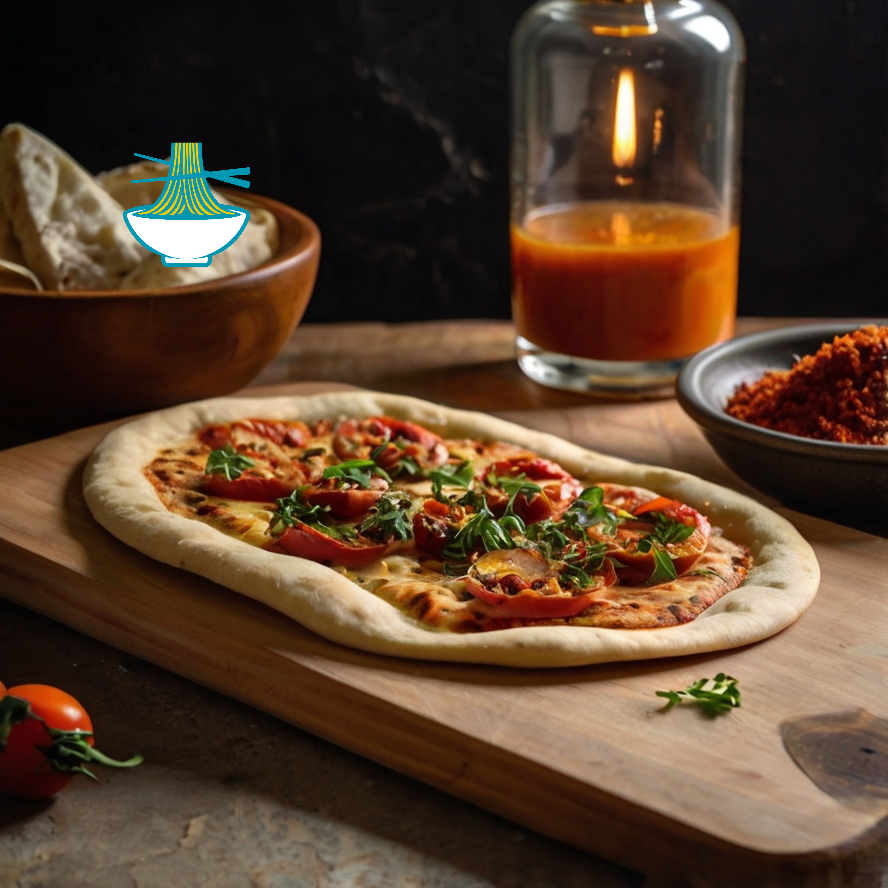Mlawi is a traditional flatbread renowned for its versatility and rich flavors. Originating from North Africa, particularly Morocco, it has become a beloved staple in the region's cuisine.
The recipe for Mlawi typically involves simple ingredients like flour, water, salt, and sometimes yeast. The dough is rolled thinly and cooked on a hot griddle or skillet until it develops a golden-brown crust.
While Mlawi can be enjoyed plain, it is often served with various fillings such as cheese, spicy harissa paste, or even sweet toppings like honey or jam. This flexibility makes it a favorite for breakfast, lunch, or dinner.
Historically, Mlawi has roots in Berber cuisine, where flatbreads have been a dietary staple for centuries. Its enduring popularity can be attributed to its delicious taste, ease of preparation, and ability to complement a wide range of flavors. Today, Mlawi continues to delight food enthusiasts worldwide with its simplicity and versatility.
Ingredients:
- 2 cups all-purpose flour
- 1 teaspoon salt
- 3/4 cup warm water
- Olive oil (for cooking)
Method:
1. Mixing the Dough:
- In a large mixing bowl, combine the flour and salt.
- Slowly add the warm water, mixing until a dough forms.
- Knead the dough on a lightly floured surface for about 5-7 minutes until it becomes smooth and elastic.
2. Resting the Dough:
- Place the dough back into the mixing bowl and cover it with a clean kitchen towel or plastic wrap.
- Let it rest for about 30 minutes to allow the gluten to relax.
3. Dividing and Rolling:
- After resting, divide the dough into small, golf-ball-sized portions.
- On a lightly floured surface, roll each portion of dough into a thin circle, about 1/8 inch thick.
4. Cooking:
- Heat a skillet or griddle over medium heat and lightly grease it with olive oil.
- Place the rolled dough onto the skillet and cook for about 1-2 minutes on each side, or until golden brown spots appear.
5. Serving:
- Once cooked, remove the Mlawi from the skillet and serve it warm.
- Mlawi can be enjoyed plain or filled with cheese, harissa, or other desired toppings.
With these simple steps, you'll have delicious Mlawi ready to enjoy in no time!
Nutrition Value:
1. All-purpose flour:
- Calories: Approximately 455 calories per cup (depending on brand)
- Carbohydrates: Approximately 95 grams per cup
- Protein: Approximately 13 grams per cup
- Fat: Approximately 1.5 grams per cup
- Sodium: Varies (typically low)
- Cholesterol: 0 milligrams
- Vitamins: Contains small amounts of B vitamins, including niacin and riboflavin
- Minerals: Contains small amounts of iron and magnesium
- Nutritional benefit: All-purpose flour provides carbohydrates for energy and a small amount of protein. It also contains some essential vitamins and minerals, although it is not a significant source of nutrients.
2. Salt:
- Calories: Negligible
- Carbohydrates: Negligible
- Protein: Negligible
- Fat: Negligible
- Sodium: Approximately 2,300 milligrams per teaspoon
- Cholesterol: 0 milligrams
- Vitamins: None
- Minerals: Primarily composed of sodium
- Nutritional benefit: Salt is used primarily for flavor enhancement in cooking. While it does not provide significant nutritional benefits, it is essential for electrolyte balance in the body and can help enhance the taste of food.
3. Warm water:
- Calories: 0
- Carbohydrates: 0 grams
- Protein: 0 grams
- Fat: 0 grams
- Sodium: 0 milligrams
- Cholesterol: 0 milligrams
- Vitamins: None
- Minerals: None
- Nutritional benefit: While warm water does not contribute significant nutrients, it is essential for hydration and helps activate the gluten in the flour, aiding in dough formation and texture development.
4. Olive oil (for cooking):
- Calories: Approximately 120 calories per tablespoon
- Carbohydrates: 0 grams
- Protein: 0 grams
- Fat: Approximately 14 grams per tablespoon (mainly monounsaturated fat)
- Sodium: 0 milligrams
- Cholesterol: 0 milligrams
- Vitamins: Contains vitamin E
- Minerals: Contains small amounts of iron
- Nutritional benefit: Olive oil is a healthy fat source, rich in monounsaturated fats, which may help reduce the risk of heart disease. It also provides vitamin E, an antioxidant, and small amounts of other nutrients. Additionally, using olive oil for cooking adds flavor to the dish.


Comments